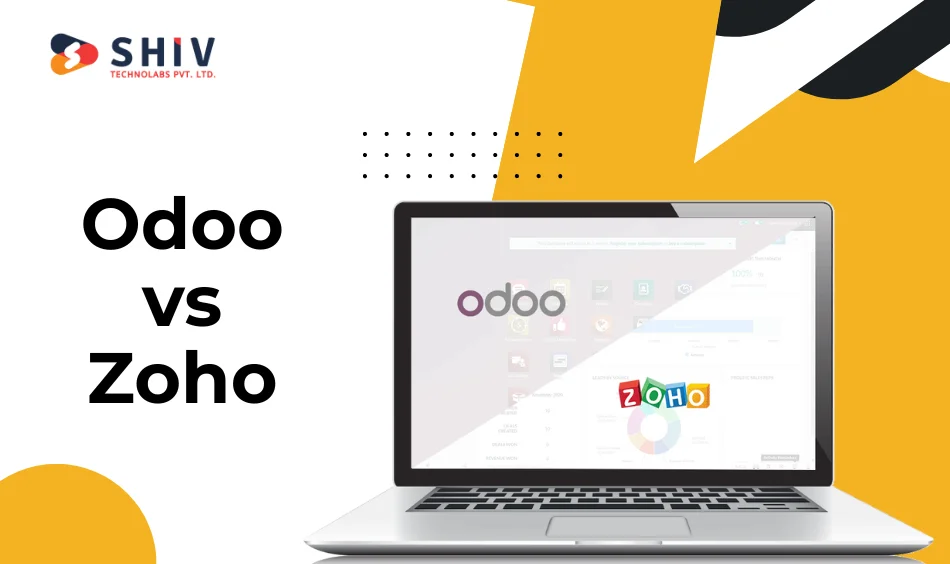Table of Contents
In the modern world, most businesses can hardly operate without ERP software. It links various departments, assists teams in collaborating, and ensures no process is omitted. Grand View Research forecasts that the ERP market will reach $117.09 billion by 2030. This highlights the importance of ERP systems in driving business development.
ERPs handle various tasks, including managing sales, tracking inventory, handling accounts, and recording customer activities. But here’s the main point—your ERP must connect well with other software you use. Without proper integration, your business may waste time and incur unnecessary expenses.
Odoo and Zoho are two of the most widely used ERP systems currently. Both have many features. Millions of users worldwide trust them. But the key question is—when you need to connect other software or build new workflows, which works better?
Let us compare Odoo and Zoho in terms of integration. This will help you decide which one is better for your company.
Odoo vs Zoho: A Quick Overview of Both Platforms

Odoo is an open-source ERP that is modular in nature. You may start by installing several apps such as Sales, CRM, or Inventory. Later, you can add apps to your business to expand it to meet all needs.
Odoo also provides complete backend access. You may install it on your servers or use its cloud version. It allows you to customize what you desire using the open-source model.
Zoho is a SaaS product. It is made to focus on medium and small companies. Zoho provides more than 40 integrated CRM, Finance, Project Management, HR, etc. applications. Each of these apps is integrated with the others within the Zoho system. This makes it simple to set up quickly. However, when you need to connect tools outside of Zoho, you may encounter limitations.
Core ERP Integration Features Compared: Odoo vs Zoho
For a quick overview, here’s a direct comparison of Odoo vs Zoho on key integration features.
Remember, good integration is not optional. It ensures an easy movement of your data between tools. In its absence, you can easily multiply your time and lose the right track.
| Feature | Odoo | Zoho |
|---|---|---|
| Platform Type | Open-source ERP (modular) | SaaS-based suite |
| CRM Integration | Native + custom via API | Native (Zoho CRM only) |
| Third-Party Integration | High flexibility | Limited to Zoho ecosystem |
| Hosting | Cloud & On-premise | Cloud-only |
| Custom Workflows | Fully customizable | App-based configuration |
| Pricing Model | App-based, modular | Per-user, per-app |
Why Odoo Is the Best ERP Platform for Integrations
Zoho is simple to use. It gives you ready-made tools. But when it comes to integrations, Odoo clearly takes the lead. Let me explain why.
1. Open-Source Flexibility
Odoo is open source. This means you can view the code, adjust modules, or build new apps from zero. Zoho does not allow this level of freedom. Odoo lets you shape the system to match your business. With Zoho, you usually need to adjust your business to fit the software.
2. Full API Access
It works with RESTful API and other methods such as XML-RPC or JSON-RPC. This allows it to have teams develop certain integrations. As an example, you may connect product information to Shopify or invoice automation to QuickBooks.
3. Custom Connectors for Popular Tools
Odoo doesn’t lock you into a small set of apps. You can connect Shopify, QuickBooks, WhatsApp, Slack, ShipStation, and more. Many connectors already exist. If you need something special, developers can build one easily.
4. Scalable for Complex Industries
Small businesses are not the only people who use Odoo. It is used by manufacturing firms, logistic suppliers, and large retailers since it manages multi-staged workflows. It is quite effective where a company requires numerous software connections.
Looking to integrate Odoo with your existing tools? Check out our Odoo integration services.
Odoo CRM vs Zoho CRM: What Businesses Should Know
Both Odoo and Zoho offer CRM tools. However, the way they handle integrations and custom features differs significantly. Let’s look at how the battle between Odoo vs Zoho CRM begins.
1. Sales Tracking & Pipeline Automation
Zoho CRM features include lead scoring, automated workflows, and pipeline tracking. These work well but are limited to Zoho’s apps. Odoo CRM also offers these features, but with more control. You can change automation settings and customize the user interface.
2. Workflow Automation
Odoo enables you to create workflows that trigger actions across various apps, including third-party ones. Zoho workflows usually work only inside Zoho’s apps. If you want to send an email from an external marketing platform, Odoo makes it easier.
3. API Access & CRM Extensions
Odoo CRM connects to other tools using APIs. You can integrate it with dialers, marketing apps, WhatsApp, and more. Zoho CRM also has APIs. But Zoho limits how you use them. You may encounter usage limits if you attempt to do too much.
Real Use Cases Where Odoo Integration Beats Zoho

It’s easy to list features, but let’s look at how this works in real businesses. Here are examples where Odoo handled integrations better than Zoho.
1. Multi-Store Retail Brand (Odoo + Shopify + ShipStation)
A retail business with multiple Shopify stores utilised Odoo to manage everything in one centralised location. Orders, inventory, and shipping were all connected. Using Odoo’s connectors, they reduced manual tasks by 70%.
2. Manufacturing Firm Using MRP + CRM + QuickBooks
A manufacturing company combined Odoo’s MRP system with its CRM and QuickBooks. This setup enabled them to sync financial data, control production, and enhance sales forecasting from a single dashboard.
3. Service Business Syncing Calendar, Email & Marketing
A consulting firm used Odoo to connect Google Calendar, Gmail, and Mailchimp. This allowed automatic syncing of appointments, emails, and marketing campaigns. It helped prevent lost leads and improved response time.
Also Read: What Is Odoo Migration and Why Does Your Business Need It?
Odoo API Integration: Technical Flexibility Explained
Odoo is made for developers who need complete control. Teams can create custom integrations with their support. Here is the technical flexibility of Odoo API integration:
1. Multiple Protocols: REST, XML-RPC, JSON-RPC
All major API protocols are compatible with Odoo. This makes it easier to connect with old legacy systems or new cloud services. Developers can choose the method that matches the third-party tool.
2. Accounting, Shipping, eCommerce, BI Tools
Odoo allows you to connect with Stripe for payments, Power BI for reporting, and WooCommerce for orders. You can send or receive data as needed. Odoo makes this process safe and reliable.
3. Developer Control & Long-Term Scalability
Zoho limits API calls based on your subscription. Odoo doesn’t do that. Developers have full freedom to create solutions that grow in tandem with the business. There’s no need to worry about usage limits.
Zoho API Integration: What Are the Limits?
Zoho’s API works for simple tasks. But as your business expands, you might find yourself stuck with Zoho API integration.
1. API Usage Limits
Zoho limits API usage by plan level. If you frequently need to sync large amounts of data, you may encounter these limits. This can cause delays or errors.
2. Ecosystem Lock-In
Most Zoho integrations are designed to function exclusively within Zoho. If you need to link Zoho CRM with another ERP, you may face technical issues. Sometimes, it’s just not possible.
3. Not Ideal for Scale
For small businesses using only Zoho apps, the system works fine. However, as you add more tools from other vendors, Zoho becomes increasingly challenging to manage. This makes it a poor choice for growing companies with complex needs.
Which ERP Should You Choose for Integration-Heavy Use Cases?
Here’s the main decision: if your business depends on integration, which ERP should you pick?
Choose Odoo If You Need:
- Full control over your ERP stack
- Custom integrations with multiple external apps
- On-premise deployment or hybrid hosting
- Scalable workflows for manufacturing, logistics, or retail
- Advanced automation that extends beyond ERP modules
Choose Zoho If You Need:
- A plug-and-play CRM or small ERP setup
- A cloud-only solution
- Basic business operations across sales, finance, and HR
- A low-code platform with minimal development requirements
- Everything to stay inside one vendor’s ecosystem
Conclusion
Odoo is preferable to you when your company utilizes a lot of applications, and you require them all to interact well. It provides you with the room to evolve, interrelate new systems, and extend your system as you develop. It supports APIs, custom modules, and an open-source model, which makes it simpler to create workflows that reflect your actual needs.
Zoho is okay when you intend to use Zoho products. However, when you have to integrate with other programs such as QuickBooks, Shopify, or WhatsApp, Zoho will restrict your actions.
So here’s our advice: stop trying to patch different tools together. Use an ERP that fits your business, rather than forcing your business to fit the ERP.
Shiv Technolabs’s Odoo development services connect Odoo with your existing software, enabling smooth integration with spreadsheets, Shopify, or legacy systems. The expert team also helps you choose the best ERP platform based on your integration needs.
Let’s build a smart system that works for your business.






















